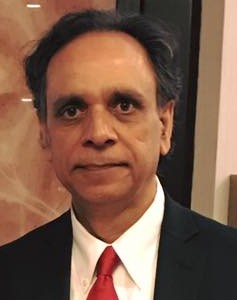By Upendra Mishra
Once you set your goal, forget about the outcome and focus only on the process. That you can do, and in fact, that is the only thing under your control. The outcome or the result is not. Remember the song?

“When I grew up and fell in love.
I asked my sweetheart, “What lies ahead?
Will we have rainbows
Day after day?”
Here’s what my sweetheart said:
“Que sera, sera,
Whatever will be, will be.”
It must have been 10-15 years ago. I attended the then TieCon annual conference and one of the speakers talked about the importance of the process in doing anything. I must say that process has been my mantra since then. Now, I can see how important the power of the process is at everything we do—even the gardening.
The TieCon speaker asked a simple question: When you take two factors into account—people and the process—what percentage weight you would attribute to the people and what percentage to the process or the system for the success or failure of a project or anything we do? The question obviously assumes that the process is created by people in the first place.
His answer shocked many in the audience. He attributed the process a staggering 93 percent and only seven percent to people. Once the process or system is set up, it seeks only the result. The process points out what was not done or what went wrong or right. It gives accurate reporting and points out fault lines where you can go back and fix missteps or errors. Unlike the process, people can be carried away by emotions, moods, relationships, self-interest and so many other factors and distractions.
The success, however, depends on single mindedness, specific goal and then the determination to figure our how to do it, how to assemble the necessary ingredients and then just do it. No distraction. Period. Even your end goal should not distract you from your goal. This practice and principle has been there since the dawn of the human civilization. Indian mythologies, especially Mahabharata, have done a great job of instilling this principle.
The goal setting is important. After the goal is set, the only requirement that follows is action with a full devotion, and yes: no distraction at any cost. In Mahabharata, we know the great teacher Dronacharya, who teaches and trains Pandavas and Kauravas during their childhood. His favorite student is Arjun because of his single mindedness. Once when some of his students accuse Dronacharya of always favoring Arjuna, the great teacher calls all his students and gives them a simple test.
He places a wooden bird on a branch of a tree and makes everyone go through the test. The test is that students have to shoot the eye of the wooden bird in the tree. He calls each student one by one, and before letting them release the arrow, he asks them what do they see. Some say they see wooden bird, some tree, some branches, some sky, some leaves and so on. Dronacharya then asks all of them all to lay down their bow and arrow.
In the end, he calls Arjuna. What do you see, he asks his favorite disciple? Arjuna confidently replies: “I only see the eye of the bird.” While all other students were distracted, Arjuna had set his eyes on his goal, the eye of the bird. He did not see anything else.
Sometimes, however, even the great students like Arjuna also get distracted by external factors and lose focus.
During the peak of Mahabharata war after Arjuna’s son Abhimanyu is killed because Jayadratha had stopped powerful Pandava warriors to enter the battle maze, Arjuna blames Jayadratha to be the cause for his son’t death. In burst of anger and outrage, Arjuna takes a vow to either kill Jayadratha before the sunset next day or kill himself by jumping in a pyre of fire if he fails to take life of Jayadratha.

When Krishna, the charioteer of Arjuna, hears Arjun’s vow, he scolds Arjuna and tells him: Now, your one eye will be on the sun and one on Jayadratha, meaning Arjuna’s attention will now be divided. Eventually, Arjuna kills Jayadratha but only with the help of Krishna as he sends his Sudarshana Chakra to mask the sun and create an illusion of sunset.
In modern times, Robin Sharma cites a Sufi story about the focus and goal in his book The Monk Who Sold His Ferrari. In this story, a young boy travels far from his home to study under a great teacher.
How long will it take me before I am as wise as you?—the student asks his teacher.
Teacher: Five years.
Student: This is a very long time. What about if I work twice as hard?
Teacher: Then it will take ten.
Student: Ten! That is far too long. How about if I studied all day and well into the night, every night?
Teacher: Fifteen years.
Student: I don’t understand. Every time I promise to devote more energy to my goal, you tell me that it will take longer. Why?
Teacher: The answer is simple. With one eye fixed on the destination, there is only one left to guide you along the journey.
Here are my two other favorite lessons from Suryaputra Karna TV serial based on Mahabharata:
CONCENTRATION: When Karna gets extremely frustrated and is not able to pass his final test before sage Parashuram agrees to accept him as his student, Parashuman asks Karna to focus. But how to focus? He tells Karna: “The most difficult obstacles in the center of full concentration (attention) are: anger, turbulence (of the mind) and pain (hurt). Make your anger, your turbulence and your pain as your weapon and use them, use them.”
PURITY: Once during his class, Dornacharya asks his students: What if you are in the battlefield and all your weapons are destroyed during the fight, how will you win war? Obviously, students have no answer. Dornacharya then answers his own question: “When your heart is pure and the goal is well-founded (atal), then anything in the nature can become your weapon.”
(Mr. Mishra is managing partner of the Waltham, MA-based integrated inbound marketing and PR firm The Mishra Group. He writes about his three passions: marketing, scriptures and gardening.)
















Mr. Upendra Mishra: Well-done. A very useful article.
Regarding setting a goal and forgetting the result: unfortunately or fortunately, most of us look at the result and judge a person’s potential.
The legendary characters, such as Arjuna, got opportunities to prove their foci and talents. In the present world, most of us do not get opportunities.
Perhaps, Dornacharya’s philosophy is useful: “… anything in the nature can become your weapon.” His remark reminds me a legend in Ramayana wherein Sri Rama used a grass leaf as a weapon.